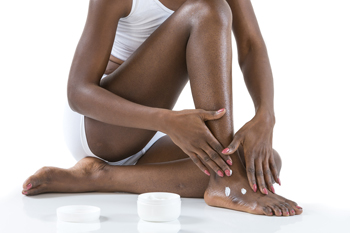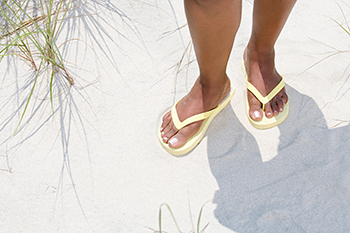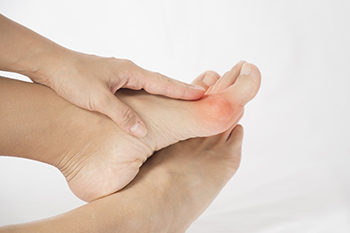
 While the feet can often be ignored in self care, taking care of your feet is a big part of being healthy and avoiding problems down the road. Proper foot care can help prevent fungal infections, cracked heels, corns, calluses, bunions, ingrown toenails and much more from developing. Since bacteria and fungi thrive in damp areas, it is important to wash and dry your feet thoroughly—especially between the toes. Moisturize your heels to prevent them from becoming dry, chapped, or cracked. Pamper your feet occasionally by soaking them to keep them soft and supple. Trim toenails straight across but not so short that ingrown toenails can occur. Wear moisture-wicking socks to keep the feet dry, and comfortable shoes that support your heels and arches as well as fit properly. It is also suggested that you have your feet checked by a podiatrist to help you maintain the best overall foot health.
While the feet can often be ignored in self care, taking care of your feet is a big part of being healthy and avoiding problems down the road. Proper foot care can help prevent fungal infections, cracked heels, corns, calluses, bunions, ingrown toenails and much more from developing. Since bacteria and fungi thrive in damp areas, it is important to wash and dry your feet thoroughly—especially between the toes. Moisturize your heels to prevent them from becoming dry, chapped, or cracked. Pamper your feet occasionally by soaking them to keep them soft and supple. Trim toenails straight across but not so short that ingrown toenails can occur. Wear moisture-wicking socks to keep the feet dry, and comfortable shoes that support your heels and arches as well as fit properly. It is also suggested that you have your feet checked by a podiatrist to help you maintain the best overall foot health.
Everyday foot care is very important to prevent infection and other foot ailments. If you need your feet checked, contact Dr. Robert Hope from Riverside Podiatry. Our doctor can provide the care you need to keep you pain-free and on your feet.
Everyday Foot Care
Often, people take care of their bodies, face and hair more so than they do for their feet. But the feet are a very important aspect of our bodies, and one that we should pay more attention to. Without our feet, we would not be able to perform most daily tasks.
It is best to check your feet regularly to make sure there are no new bruises or cuts that you may not have noticed before. For dry feet, moisturizer can easily be a remedy and can be applied as often as necessary to the affected areas. Wearing shoes that fit well can also help you maintain good foot health, as well as making it easier to walk and do daily activities without the stress or pain of ill-fitting shoes, high heels, or even flip flops. Wearing clean socks with closed shoes is important to ensure that sweat and bacteria do not accumulate within the shoe. Clean socks help to prevent Athlete’s foot, fungi problems, bad odors, and can absorb sweat.
If you have any questions please feel free to contact our office located in Tuscaloosa, and Fayette, AL . We offer the newest diagnostic and treatment technologies for all your foot and ankle needs.
 There are so many different styles of shoes that are available for purchase, but flip flops are often the quick go to and one of the most dangerous to frequently wear. Various foot conditions may develop as a result of wearing flip flops and most can cause severe pain and discomfort. Some of these ailments can include blisters, corns, arch pain, Achilles tendonitis, and most commonly plantar fasciitis or heel pain. It is a natural reaction for the toes to grip the front of the shoe in an effort to have them stay on the feet. This can lead to aching and soreness throughout the entire foot. If flip flops are still your top choice to wear it can be beneficial to rotate them with other styles of flip flops. Sandals that have a strap around the heel can also be less harmful to the feet and it may help to wear high-quality flips flops that are constructed of leather materials. Additionally, it is suggested to refrain from wearing socks with flip flops as this can cause foot strain too. If you have questions about how to choose the right flip flops for you, please consult with a podiatrist.
There are so many different styles of shoes that are available for purchase, but flip flops are often the quick go to and one of the most dangerous to frequently wear. Various foot conditions may develop as a result of wearing flip flops and most can cause severe pain and discomfort. Some of these ailments can include blisters, corns, arch pain, Achilles tendonitis, and most commonly plantar fasciitis or heel pain. It is a natural reaction for the toes to grip the front of the shoe in an effort to have them stay on the feet. This can lead to aching and soreness throughout the entire foot. If flip flops are still your top choice to wear it can be beneficial to rotate them with other styles of flip flops. Sandals that have a strap around the heel can also be less harmful to the feet and it may help to wear high-quality flips flops that are constructed of leather materials. Additionally, it is suggested to refrain from wearing socks with flip flops as this can cause foot strain too. If you have questions about how to choose the right flip flops for you, please consult with a podiatrist.
Flip-flops can cause a lot of problems for your feet. If you have any concerns about your feet or s, contact Dr. Robert Hope from Riverside Podiatry. Our doctor will assist you with all of your foot needs.
Flip-Flops and Feet
Flip-flops have managed to become a summer essential for a lot of people. While the shoes may be stylish and easy to slip on and off, they can be dangerous to those who wear them too often. These shoes might protect you from fungal infections such as athlete’s foot, but they can also give you foot pain and sprained s if you trip while wearing them.
When Are They Okay to Wear?
Flip-flops should only be worn for very short periods of time. They can help protect your feet in places that are crawling with fungi, such as gym locker rooms. Athlete’s foot and plantar warts are two common fungi that flip-flops may help protect your feet against.
Why Are They Bad for My Feet?
These shoes do not offer any arch support, so they are not ideal for everyday use. They also do not provide shock absorption or heel cushioning which can be problematic for your feet. Additionally, you may suffer from glass cuts, puncture wounds, and stubbed toes since they offer little protection for your feet.
More Reasons Why They Are Bad for Your Feet
If you have any questions, please feel free to contact our office located in Tuscaloosa, and Fayette, AL . We offer the newest diagnostic and treatment technologies for all your foot care needs.
Read more about Flipping Out About Flip Flops Bunions are bony growths that appear on the outer side of the foot at the base of the big toe joint. This is a deformity that may cause pain, swelling, redness, and difficulty wearing shoes and while walking. When left untreated, bunions tend to progressively worsen over time. As a bunion grows, it pushes the big toe towards the smaller toes, changing the shape of the foot in the process. The misaligned big toe may then push the second toe out of alignment. Bunions can also lead to arthritis in the big toe joints. Bunions can be managed and their progression can be slowed through a variety of conservative treatments, such as footwear modifications. Surgery may also be an option and can permanently correct a bunion. If you suffer from bunions, it is suggested that you see a podiatrist for treatment.
Bunions are bony growths that appear on the outer side of the foot at the base of the big toe joint. This is a deformity that may cause pain, swelling, redness, and difficulty wearing shoes and while walking. When left untreated, bunions tend to progressively worsen over time. As a bunion grows, it pushes the big toe towards the smaller toes, changing the shape of the foot in the process. The misaligned big toe may then push the second toe out of alignment. Bunions can also lead to arthritis in the big toe joints. Bunions can be managed and their progression can be slowed through a variety of conservative treatments, such as footwear modifications. Surgery may also be an option and can permanently correct a bunion. If you suffer from bunions, it is suggested that you see a podiatrist for treatment.
If you are suffering from bunion pain, contact Dr. Robert Hope of Riverside Podiatry. Our doctor can provide the care you need to keep you pain-free and on your feet.
What Is a Bunion?
Bunions are painful bony bumps that usually develop on the inside of the foot at the joint of the big toe. As the deformity increases over time, it may become painful to walk and wear shoes. Women are more likely to exacerbate existing bunions since they often wear tight, narrow shoes that shift their toes together. Bunion pain can be relieved by wearing wider shoes with enough room for the toes.
Causes
Symptoms
In order to diagnose your bunion, your podiatrist may ask about your medical history, symptoms, and general health. Your doctor might also order an x-ray to take a closer look at your feet. Nonsurgical treatment options include orthotics, padding, icing, changes in footwear, and medication. If nonsurgical treatments don’t alleviate your bunion pain, surgery may be necessary.
If you have any questions, please feel free to contact our office located in Tuscaloosa, and Fayette, AL . We offer the newest diagnostic and treatment technologies for all your foot care needs.